Dryobates
Dryobates is a genus of birds in the woodpecker family Picidae. The species are widely destributed and occur in both Eurasia and the Americas.
| Dryobates | |
|---|---|
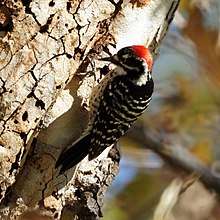 | |
| Male Nuttall's woodpecker in California, USA | |
| Scientific classification | |
| Kingdom: | Animalia |
| Phylum: | Chordata |
| Class: | Aves |
| Order: | Piciformes |
| Family: | Picidae |
| Tribe: | Melanerpini |
| Genus: | Dryobates F. Boie, 1826 |
| Species | |
|
Six, see text | |
Taxonomy
The genus Dryobates was named by the German naturalist Friedrich Boie in 1826 with the downy woodpecker (Dryobates pubescens) as the type species.[1]
The genus name Dryobates is from the Greek compound word δρυο-βάτης : 'woodland walker'; from δρῦς : drus (genitive δρυός : dryós) meaning woodland and -βάτης : -bátēs meaning walker.[2] In the eBird/Clements Checklist of Birds of the World, the genus Dryobates is expanded to include all the species in Leuconotopicus and Veniliornis.[3]
The genus contains the following species:[4]
| Image | Scientific name | Common Name | Distribution |
|---|---|---|---|
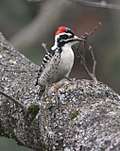 | Dryobates nuttalli | Nuttall's woodpecker | northern California extending south towards the northwest region of Baja California, Mexico |
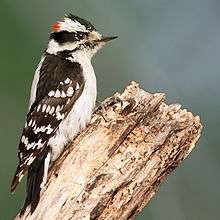 | Dryobates pubescens | Downy woodpecker | North America |
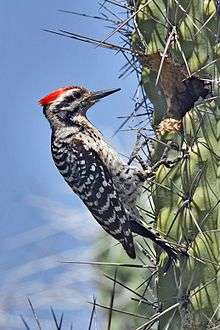 | Dryobates scalaris | Ladder-backed woodpecker | southwestern United States (north to extreme southern Nevada and extreme southeastern Colorado), most of Mexico, and locally in Central America as far south as Nicaragua |
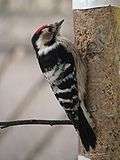 | Dryobates minor | Lesser spotted woodpecker | Europe |
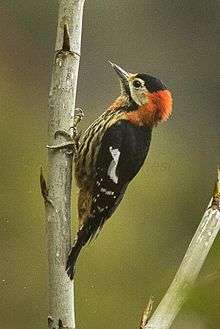 | Dryobates cathpharius | Crimson-breasted woodpecker | Bangladesh, Bhutan, China, India, Laos, Myanmar, Nepal, Thailand, and Vietnam |
gollark: Citing a few examples of bad things is not actually evidence of larger scale trends.
gollark: Apparently they just sit there for ages looking at things with incredibly underpowered eyes (which they're able to get useful images out of via combining images over lots of time or something) and planning, then do things.
gollark: They can do stuff like plan ambushes in advance. Very cool.
gollark: Fairly advanced cognition running on a brain several orders of magnitude smaller than a human's via ridiculous levels of timesharing.
gollark: Speaking of spiders, have you heard of Portia spiders? They're very cool.
References
- Boie, Friedrich (1826). "Generalübersicht". Isis von Oken (in German). Jena. 18-19. Col 977.
- Jobling, James A. (2010). The Helm Dictionary of Scientific Bird Names. London: Christopher Helm. p. 140. ISBN 978-1-4081-2501-4.
- Clements, J.F.; Schulenberg, T.S.; Iliff, M.J.; Billerman, S.M.; Fredericks, T.A.; Sullivan, B.L.; Wood, C.L. (2019). "The eBird/Clements Checklist of Birds of the World: v2019". Retrieved 18 May 2020.
- Gill, Frank; Donsker, David (eds.). "Woodpeckers". World Bird List Version 6.2. International Ornithologists' Union. Retrieved 5 May 2016.
This article is issued from Wikipedia. The text is licensed under Creative Commons - Attribution - Sharealike. Additional terms may apply for the media files.